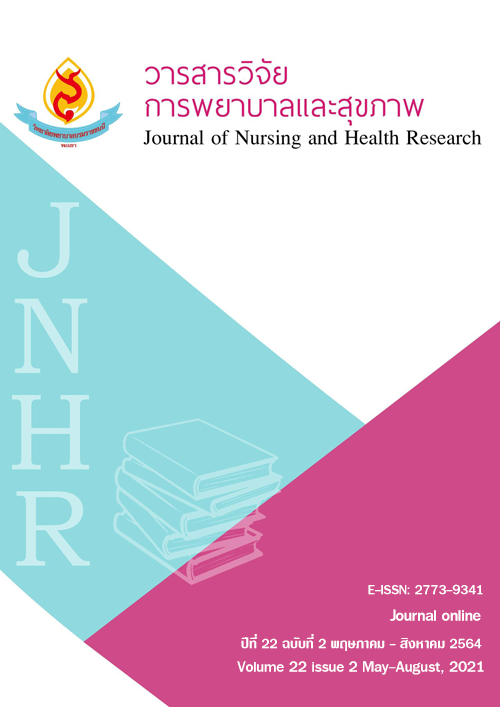การศึกษาพยาบาลกับคนต่างรุ่นยุคศตวรรษที่ 21
คำสำคัญ:
การศึกษาพยาบาล, ศตวรรษที่ 21, คนต่างรุ่นบทคัดย่อ
การศึกษาพยาบาลในยุคศตวรรษที่ 21 ซึ่งความเปลี่ยนแปลงเกิดอย่างรวดเร็ว เป็นผลจากความเจริญด้านเทคโนโลยี ทำให้การเรียนด้วยตนเอง เป็นไปได้โดยง่ายมากขึ้น ผู้สอนต้องเปลี่ยนบทบาทมีหน้าที่เป็นโค้ช (coach) คือ สอนให้น้อย กระตุ้นให้ผู้เรียนเรียนรู้ให้มาก และกระตุ้นให้มีการสร้างสรรค์และพัฒนาตัวเอง ในขณะที่ผู้สอนในปัจจุบันต่างมีประสบการณ์หลากหลาย เป็นคนในรุ่น generation B (Gen B), generation X (Gen X) และ generation Y (Gen Y) ที่ต้องมีความเข้าใจผู้เรียนยุคใหม่ และปรับบทบาทการสอนให้สอดคล้องกับลักษณะนิสัยและพฤติกรรมของผู้เรียนที่อยู่ใน generation z (Gen Z) ซึ่งเติบโตมาพร้อมกับเข้าถึงอินเตอร์เน็ตและเทคโนโลยีซึ่งเจริญก้าวหน้าอย่างรวดเร็ว อาจเป็นผลให้ผู้สอนและผู้เรียนมีความต่างกันมาก จึงควรมีความคิดวิเคราะห์เพื่อเข้าใจความแตกต่างและแสวงหาวิธีการส่งเสริมให้ผู้เรียนและผู้สอนต่างรุ่น มีปฏิสัมพันธ์ที่ดี และเกิดการเรียนรู้ได้อย่างมีประสิทธิภาพ บทความนี้ได้อธิบายลักษณะคนทั้ง 4 รุ่น ประกอบด้วย Gen B, Gen X, Gen Y และ Gen Z และเสนอวิธีการการจัดการเรียนรู้ที่เหมาะสมระหว่างผู้สอนรุ่นต่าง ๆ กับผู้เรียน Gen Z ทั้งนี้เพื่อให้เกิดความเข้าใจ และเป็นประโยชน์ในการจัดการศึกษาให้เหมาะสม และมีประสิทธิภาพ
เอกสารอ้างอิง
กัญญดา ประจุศิลป. (2561). การจัดการทางการพยาบาลและภาวะผู้นำ. กรุงเทพฯ: โรงพิมพ์แห่งจุฬาลงกรณ์มหาวิทยาลัย.
เครือข่าย P21. (มปป.) ทักษะแห่งอนาคตใหม่: การเรียนรู้ในศตวรรษที่ 21. สืบค้นเมื่อ 14 กันยายน 2563, จาก http://www.myfirstbrain.com/teacher_view.aspx?ID=88620
ชัชวาล วงค์สารี. (2558). การสอนบนคลินิกในรายวิชาการปฏิบัติการพยาบาลผู้ใหญ่และผู้สูงอายุสำหรับนิสิต Generation Z. วารสารวิทยาลัยพยาบาลบรมราชชนนี กรุงเทพฯ, 31(2), 130 -140.
ชัชวาล วงค์สารี. (2562). การสอนการคิดให้มีวิจารณญาณในนักศึกษาพยาบาล Generation Z: การทบทวนวรรณกรรม. วารสารพยาบาลทหารบก, 20(1), 21-30.
ธนพล บรรดาศักดิ์, บุญสืบ โสโสม, กนกอร ชาวเวียง, นฤมล จันทรเกษม, กนกพร เทียนคำศรี, และสุนทรี สิทธิสงคราม. (2561). การเป็นผู้เรียนในยุคศตวรรษที่ 21: มุมมองจากอาจารย์และนักศึกษาพยาบาล. วารสารสันติศึกษาปริทรรศน์, 4(2), 175-189.
วงเดือน สุวรรณคีรี, อรพิน จุลมุสิ, และฐิติอาภา ตั้งค้าวานิช. (2559). การจัดการเรียนรู้โดยสถานการณ์จำลองสำหรับนิสิตนักศึกษาพยาบาล. วารสารพยาบาลศาสตร์จุฬาลงกรณ์มหาวิทยาลัย, 28(2), 1-14.
วริศดา พุกแก้ว และขันทอง วัฒนะประดิษฐ์. (2559). พุทธสันติวิธีเพื่อการเข้าถึงความสุขในการทำงานของพยาบาลวิชาชีพ โรงพยาบาลวิหารแดง จังหวัดสระบุรี. วารสารสันติศึกษาปริทรรศน์ มจร, 4(1), 155 - 173.
เสาวลักษณ์ จิรธรรมคุณ, อรุณรัตน์ เทพนา, และธัญยรัชต์ องค์มีเกียรติ. (2559). การบริหารการพยาบาล. กรุงเทพฯ: TBS Product.
สุปราณี พลธนะ. (2563). นักศึกษาพยาบาล: ประเด็นความรุนแรงในการฝึก ปฏิบัติการพยาบาล. สืบค้นเมื่อ 1 สิงหาคม, 2564, จาก https://mid.nmd.go.th/wp-content/uploads/2020/01/22-ม.ค.63-อภิปรายความรุนแรงใน-รพ.-น.ท.หญิง-สุปราณ.pdf
อภิชา อินสุวรรณ, ณัฐหรินทร์ แพทยานนท์, ฐิติพร ฐิติจำเริญพร, และปนัดดา เดชวงศ์ญา. (2561). จัดการศึกษาเพื่อพัฒนาทรัพยากรมนุษย์ในแต่ละช่วงวัยบนพื้นฐานของแผนพัฒนาเศรษฐกิจและสังคมแห่งชาติ ฉบับที่ 12 และไทยแลนด์ 4.0 โมเดล. วารสารมหาวิทยาลัยพายัพ, 28(2), 21-39.
Duse, S. C., & Duse, D. M., (2016). The teacher of the generation Z. Retrieved June 29, 2021, from https://www.researchgate.net/pub jlication/ 311025822
Grail Research. (2011). Consumers of Tomorrow Insights and Observations about Generation Z. Retrieve June 6, 2021, from https://docplayer.net/31078434-Consumers-of-tomorrow.html
Kim, J., Chae, D. & Yoo, J. Y. (2021). Reasons behind generation Z nursing students’ intentions to leave their profession: a cross-sectional study. The Journal of Health Care Organization, Provision, and Financing, 58, 1-8
Knight R. (2014). Managing people from 5 generations. Harvard Business Review. Retrieved October 19, 2020, from https://hbr.org/2014/09/managing- people-from -5-generations.r
McQueen, M. (2011). Ready or not...here come gen Z. Retrieved August 15, 2021, from http://michaelmcqueen.net/phocadownload/parentsteachers/Ready%20or%20 not,%20here%20come%20Gen%20Z.pdf.
Zemke, R., Raines, C., & Filipczak, B. (2000). Generations at work: managing the clash of veterans, boomers, xers, and nexters in your workplace. NY: AMACOM.
ดาวน์โหลด
เผยแพร่แล้ว
รูปแบบการอ้างอิง
ฉบับ
ประเภทบทความ
สัญญาอนุญาต
ลิขสิทธิ์ (c) 2021 วารสารวิจัยการพยาบาลและสุขภาพ

อนุญาตภายใต้เงื่อนไข Creative Commons Attribution-NonCommercial-NoDerivatives 4.0 International License.



